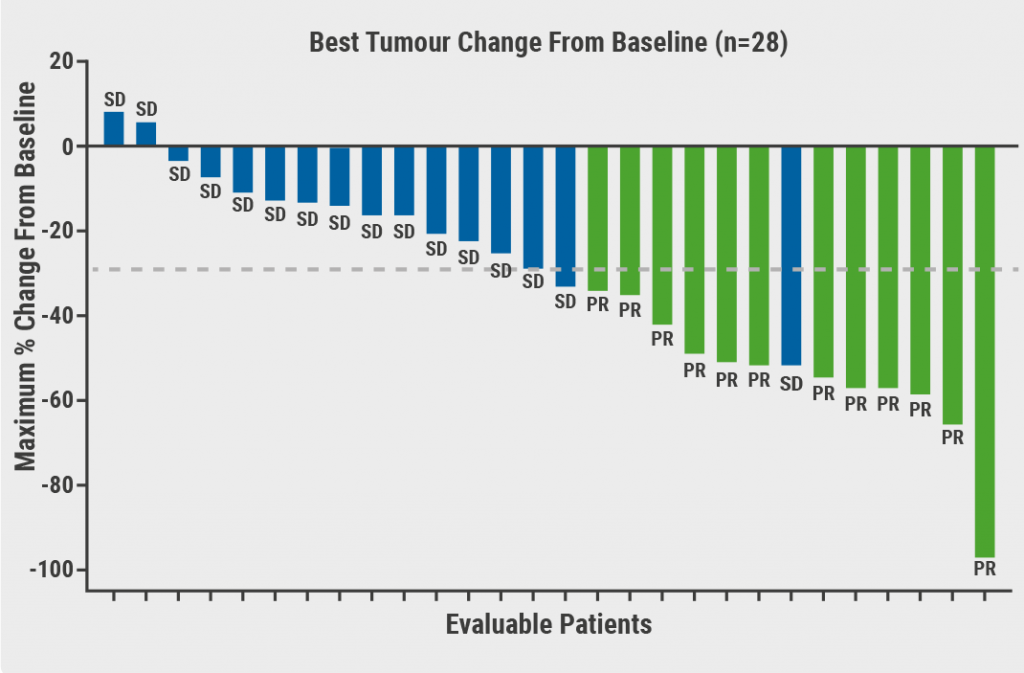https://doi.org/10.55788/efbf9245
Obefazimod is a small molecule, entailing an upregulation of microRNA 124 and a consequent decrease in inflammatory cytokines and chemokines [1,2]. After positive results of a 16-week induction trial (NCT04023396) that assessed various treatment regimens in adult patients with moderate-to severe UC, all participants were eligible to enter a 96-week, open-label extension [1]. In terms of a first evaluation of long-term efficacy and safety of once-daily 50 mg obefazimod, the 48-week interim data was presented.
Of the participants in the initial study cohort, 97.7% (n=217) took part in the open-label extension trial. The participants had a mean age of 42.1 years, were predominantly men, and had a median faecal calprotectin level of 204.7 µg/g. Nearly half used corticosteroids and 45.2% had been treated with biologics or JAK inhibitors before. For those who did not complete week 48, non-responder imputation was used.
At week 48, the rates of clinical remission and clinical response were 54.8% and 82.0%. The proportion of patients within these groups who experienced these outcomes de novo, meaning they had no remission or response after induction, were 48.2% and 76.3%. Endoscopic improvement was present in 61.3% of patients and endoscopic remission was achieved by 33.2%. Of these 2 outcomes, there were de novo rates of 54.6% and 30.3%, respectively. Overall, 124/217 participants in the extension cohort had a response after 8 weeks of induction. Of these primary responders, 66.1% were in clinical remission, 37.9% in endoscopic remission, and 70.2% demonstrated endoscopic improvement at week 48.
The safety analysis found 65% of participants with ≥1 treatment-emergent adverse event (TEAE), with serious TEAEs in 7.8%. The study had to be discontinued due to TEAEs in 6.9% of participants. Most frequent were COVID-19 and headache (both in 11.5%), as well as UC and nasopharyngitis (in 6.9% and 6.5%).
In conclusion, Prof. Séverine Vermeire (University Hospital Leuven, Belgium) and co-authors confirmed a long-term efficacy and a favourable safety profile of obefazimod at a dosage of 50 mg/day in this phase 2b trial. A global phase 3 induction and maintenance study will be initiated soon.
- Vermeire S, et al. ABX464 (obefazimod) in patients with moderate-to-severe ulcerative colitis: an interim 48-week safety and efficacy analysis from an ongoing 96-week open-label maintenance phase 2b study. MP250, UEG Week 2022, 8–11 October, Vienna, Austria.
- Vermeire S, et al. Lancet Gastroenterol Hepatol. 2022;7(11):1024–1035.
Copyright ©2022 Medicom Medical Publishers
Posted on
Previous Article
« Pivotal results of etrolizumab for CD partly disappointing Next Article
Another chance for TYK2 inhibition in UC »
« Pivotal results of etrolizumab for CD partly disappointing Next Article
Another chance for TYK2 inhibition in UC »
Table of Contents: UEGW 2022
Featured articles
IBD in 2022
Fast recapture of response with ozanimod after withdrawal in UC
Ozanimod treatment prompted substantial response after failure of response to induction
Etrasimod shows advantage over placebo in UC
Etrasimod reduces adaptive immune cells in the periphery in UC
Favourable maintenance rates for risankizumab also in delayed responders with CD
IL-23 inhibition reduces inflammatory biomarkers in pre-treated UC
Maintained symptom control with mirikizumab in UC
Mirikizumab successfully resolves active histologic inflammation in UC
Upadacitinib for CD: remarkable efficacy in induction therapy
Sustained maintenance results with upadacitinib in UC
Another chance for TYK2 inhibition in UC
Small molecule obefazimod shows promise in UC
Pivotal results of etrolizumab for CD partly disappointing
Better results for vedolizumab in early CD
Some patients with limited CD may benefit from an early surgical intervention
Dose-interval of adalimumab might be prolonged in CD patients in stable remission
What Is Hot in Upper GI Disorders?
Less ulcer bleeds early after H. pylori eradication in aspirin users
Dupilumab effective in paediatric patients with eosinophilic oesophagitis
Neoplasia in Barrett’s oesophagus: the earlier the intervention, the better the long-term outcome
Hepatology in 2022
Favourable pancreatitis outcomes with procalcitonin-based algorithm to guide antibiotic use
Portal hypertension is associated with poor prognosis in cirrhotic patients
Chances of transplant-free survival in PSC enhanced by colectomy with ileostomy
SARS-CoV-2: Booster doses of key importance for cirrhotic patients
What Is New in Pancreatic Cancer and Pancreatitis?
Fewer long-term interventions after delayed drainage in necrotising pancreatitis
Detection of Europe´s deadliest cancer: much room for improvement
Colorectal Carcinoma: Improving Diagnosis and Therapy
Immunotherapy response may be modulated by microbiome
Computer-aided colonoscopies improved adenoma detection rates
Screening-detected colorectal cancers may have superior surgical outcomes
Related Articles
November 19, 2021
Immune chemo-sensitisation looks promising in microsatellite-stable mCRC

© 2024 Medicom Medical Publishers. All rights reserved. Terms and Conditions | Privacy Policy
HEAD OFFICE
Laarderhoogtweg 25
1101 EB Amsterdam
The Netherlands
T: +31 85 4012 560
E: publishers@medicom-publishers.com

